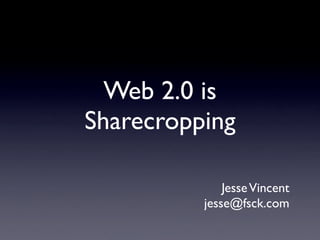Web 2.0 is Sharecropping
- 3. This is a rant.
- 4. The bad old days:
- 6. You farmed land you didnĄŊt own...
- 7. ...with tools you couldnĄŊt really afford.
- 8. You paid for it with part of your harvest...
- 9. A pretty sweet deal...
- 10. ...until things got bad.
- 11. (Things always got bad.)
- 12. In a bad year, you got further in debt to the land owner.
- 14. The (more recent) bad old days:
- 16. Things got a little better:
- 17. Pic of PCs
- 18. Things werenĄŊt all rosy:
- 19. Pic of BSOD
- 20. Sometimes new versions of software killed features...
- 21. ...so you were locked in to old versions.
- 22. pic of win 31?
- 24. rms che
- 25. Now, things are getting worse again...
- 27. What happens when your favorite service goes down?
- 28. pic of twitter being down
- 29. ...or stops accepting new signups?
- 31. ...or gives all your data to the secret police?
- 32. Pic of yahoo.cn
- 33. You donĄŊt own the services you use.
- 34. When the service provider cuts you off, thatĄŊs it. No recourse.
- 35. Not so secret shame: IĄŊm a really bad zealot.
- 36. My calendar lives at google.com.
- 37. I make a web 2.0 tasklist service called Hiveminder.com
- 39. Using hosted apps is going to hurt you.
- 41. APIs are great.
- 42. ...but easy access to a service just makes it easier to get locked in.
- 43. What about Google Gears,Adobe Air, etc?
- 44. Great. now you can use your word processer while youĄŊre of?ine!
- 46. Real of?ine apps shouldnĄŊt need servers.
- 47. Real of?ine apps should sync like you do.
- 48. IĄŊve been hacking on an open source database called Ą°ProphetĄą.
- 49. It has an API like Amazon SimpleDB or Google App EngineĄŊs...
- 50. ItĄŊs designed for Ą°team-scaleĄą apps.
- 51. ItĄŊs built for P2P replication and disconnected use.
- 52. App #1 is the canonical Ą°of?ine bug trackerĄą.
- 53. App #2 will probably be a BBS you can sync over sneakernet.
- 55. Make sure nobody can take away your right to use your software. Thanks!























































